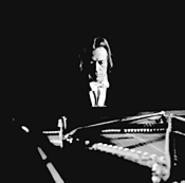This artistic paradox is at the heart of Michael Daugherty's Le Tombeau de Liberace, a four-movement suite for piano and chamber orchestra, which will be played Saturday, October 20, by pianist Philip Thomson and the Akron Symphony Orchestra, as part of their "Autumn Tableau" concert.
"I first heard it live in Detroit, where Michael Daugherty is composer-in-residence [with the Detroit Symphony Orchestra]," says Akron Symphony Music Director Ya-Hui Wang, who will conduct the concert. "Michael's style is quite different from other American composers," she says. "He incorporates much of his background, but with a classical touch."
The Iowa native's background included stints with rock and fusion bands, drum-and-bugle corps, and playing the organ at state and county fairs. Daugherty balanced this eclectic work with studies in Paris, at Yale -- where he worked with composers Jacob Druckman and Bernard Rands -- and in Hamburg, with the great Hungarian master György Ligeti. He also taught for a while at Oberlin College and is on the faculty of the University of Michigan.
In Le Tombeau de Liberace, Daugherty doesn't so much re-create the experience of Wladziu Valentino Liberace as meditate on the life of the flamboyant pop icon. He references Liberace's brassy Las Vegas concerts and uses "found" material: The cadenza, "Sequin Music," is based on the note sequences that were painted on the wall of Liberace's famous piano-shaped swimming pool. Le Tombeau is a showpiece that Liberace himself might have played, had he lived long enough to see the score.
"Michael is very good at this kind of fusion," says University of Akron composition professor Daniel McCarthy, who will give the pre-concert talk. "He makes a conscious effort to connect high art and low art."
American icons like Liberace have always loomed large in Daugherty's landscape. Two of his best-known pieces celebrate characters who need no introduction -- Superman, in the Metropolis Symphony, and the King, in Dead Elvis, a composition for bassoon and orchestra. The composer's sense of humor shines in the Elvis piece: Whenever it's performed in concert, the music publisher sends a late-Elvis, Vegas-style costume for the bassoonist to wear.
Pianist Philip Thomson, however, won't be decked out like a peacock for Le Tombeau de Liberace. Daugherty has said that he sees his music not as parody, but as a serious, high-spirited consideration of popular culture.
"I think Michael is more apt to bring the vernacular directly into his musical language," says McCarthy.
"He doesn't try to legitimize pop by making it 'classical.'"


